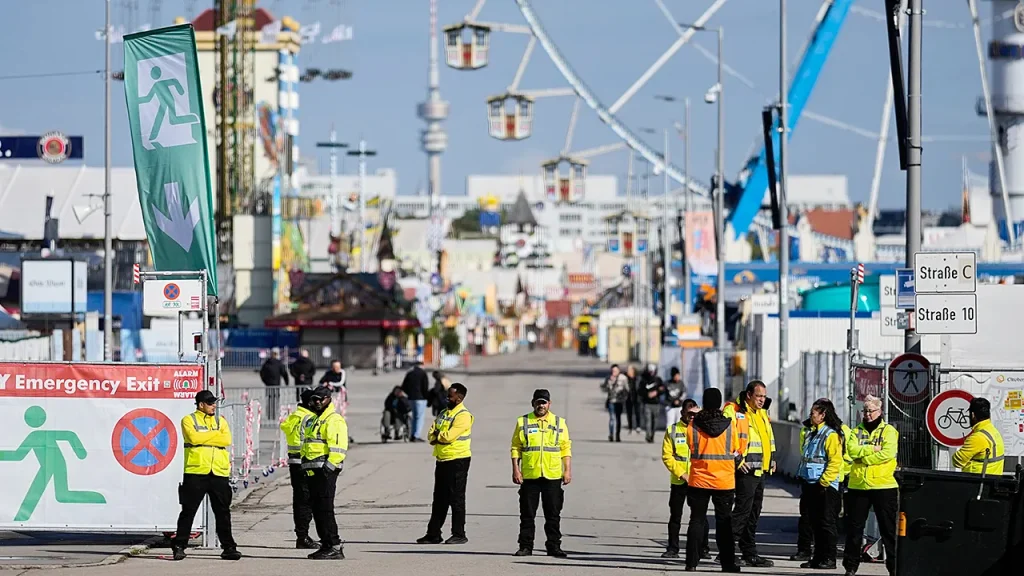Bomb Threat Disrupts Munich’s Oktoberfest Amid Domestic Dispute
In a concerning turn of events that has shaken Munich’s most celebrated festival, German authorities temporarily closed the Oktoberfest fairgrounds on Wednesday morning following a bomb threat. The threat emerged in the aftermath of an explosion at a residential building in northern Munich, which police have determined was deliberately set ablaze as part of a domestic dispute. City officials acted swiftly to ensure public safety at the world-famous beer festival, demonstrating the seriousness with which such threats are treated in a country all too familiar with the potential for public violence. The incident has cast a shadow over what is typically a joyous celebration of Bavarian culture, raising questions about security measures at large public gatherings.
The early morning explosion appears to have resulted in at least one fatality, though authorities have not yet clarified whether the deceased was the suspected perpetrator or another individual. Adding to the complexity of the situation, another person connected to the incident remained missing, though police were quick to reassure the public that this individual was not considered dangerous. The scene at the residential building became even more concerning when specialized teams were deployed to defuse potential booby traps discovered within the structure, suggesting a level of premeditation that alarmed investigators. Eyewitnesses reported seeing a burned-out van near the explosion site, further indicating the severity of the incident that would eventually lead to the Oktoberfest closure.
The connection between the residential explosion and the Oktoberfest threat became apparent when authorities discovered a letter from the alleged perpetrator specifically threatening the festival. This discovery prompted an immediate security response, with police conducting thorough searches throughout the sprawling fairgrounds for any explosive devices that might have been planted. Workers were evacuated from the area as a precautionary measure, and officials announced that the festival would remain closed at least until 5 p.m. local time. The decision to shut down such a massive economic and cultural event, even temporarily, underscores the gravity with which authorities viewed the threat, prioritizing public safety above all else during what is normally a time of celebration and community.
This year’s Oktoberfest, which began on September 20 and is scheduled to run until October 5, typically draws up to six million visitors from around the world. The festival stands as not just a celebration of beer, but as a cornerstone of Bavarian identity and a significant economic driver for Munich. Vendors, breweries, hospitality workers, and countless others depend on the sixteen-day festival for their livelihoods, making any disruption particularly impactful beyond just the disappointment of tourists and locals alike. The temporary closure represents not only a security challenge but also a potential economic blow to the many small businesses and workers who rely on the festival’s success each year, highlighting the ripple effects that security threats can have on communities.
The bomb threat carries particularly painful echoes for Munich, as Oktoberfest was the target of a devastating neo-Nazi attack in 1980. That bombing, which occurred on the evening of September 26, claimed thirteen lives, including three children and the perpetrator himself, Gundolf Koehler, who was a supporter of a banned far-right group. More than 200 people were wounded in what remains one of the most traumatic terrorist attacks in modern German history. This historical context likely influenced the decisive action taken by authorities in response to Wednesday’s threat, demonstrating how past tragedies continue to shape security protocols and emergency responses at major public events, particularly those with symbolic cultural significance.
As Munich navigates this unsettling situation, the incident serves as a stark reminder of the security challenges facing large public gatherings in the modern era. While Oktoberfest represents joy, community, and tradition for millions, it also presents a potential target for those seeking to cause harm or disruption. The swift response by German authorities illustrates the delicate balance between maintaining open, celebratory public spaces and ensuring the safety of all participants. As investigations continue into both the explosion and the subsequent threat, Munich residents and visitors alike await the reopening of their beloved festival, hoping that this temporary disruption will soon give way to the resumption of festivities, albeit with heightened awareness and perhaps additional security measures in place to protect the celebration that has defined Bavarian culture for generations.


